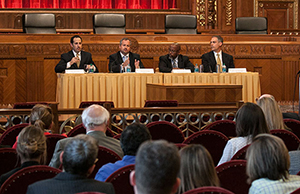Panelists Discuss Landmark Indigent Counsel Case 50 Years Later

Forum on the Law panel members (from left) Alan Michaels, dean, The Ohio State University Moritz College of Law; Timothy Young, director, Office of the Ohio Public Defender; David Singleton, executive director, Ohio Justice and Policy Center; and Hon. Nick Selvaggio, judge, Champaign County Common Pleas Court.

Forum on the Law panel members (from left) Alan Michaels, dean, The Ohio State University Moritz College of Law; Timothy Young, director, Office of the Ohio Public Defender; David Singleton, executive director, Ohio Justice and Policy Center; and Hon. Nick Selvaggio, judge, Champaign County Common Pleas Court.
A panel of Ohio legal professionals discussed how a jailhouse lawyer changed history 50 years ago during the Ohio Supreme Court’s Forum on the Law on May 23.
View the complete program online.
Panelists explored the U.S. Supreme Court’s decision in Gideon v. Wainwright – the landmark case requiring states to provide counsel for indigent defendants under the Fourteenth Amendment. Part of the discussion centered on whether the guaranteed right to counsel is being fulfilled five decades later. Panelists also addressed how the structure and funding of Ohio’s indigent defense system impacts that promise and quality representation.
Tim Young, director of the Office of the Ohio Public Defender, said Ohio has failed Gideon’s promise because of the structure and funding of the indigent delivery system. He said Ohio has failed in part because a 1984 case, Strickland v. Washington, established a right to an effective lawyer but didn’t define effectiveness. He said the Strickland case “undermines any incentive to improve our structure or funding.”
He noted that many examples of bad lawyering have been deemed effective. The difficulty is that defendants must prove the outcome of the case would have been different but for the bad lawyering. He advocated for Ohio to move to a “bottom-line” system where everyone is entitled to a fair trial. “If it wasn’t fair, we do it again.”
David Singleton, executive director of the Ohio Justice and Policy Center in Cincinnati, spoke about the client-centered culture that’s needed in public defender offices. He said during his time at public defender offices in Harlem and Washington, D.C. they “were trained to walk through fire for our clients” and sometimes that didn’t make judges happy.
After moving to Cincinnati in 2001, he said he wanted to work at the public defender’s office but he didn’t see the same culture. He said the office is “turning it around,” but the number of cases handled were higher and the investigative resources were fewer than in his previous experience.
“It (client representation) can’t be about keeping judges happy,” he said. “It can’t be about that if we’re serious about making sure that Gideon’s promise is fulfilled.”
Champaign County Common Pleas Court Judge Nick Selvaggio, who until four months ago was the county’s prosecutor, said judges and prosecutors have a role in fulfilling Gideon’s promise.
Modifying Criminal Rule 16 and making more information available to criminal defense attorneys at an earlier stage in the process was the “right thing to do,” Selvaggio said. He said that judges have a responsibility to train attorneys and alter the way they handle certain problems, like treating letters from inmates as motions for judicial release. Judges, prosecutors, and defense attorneys have a responsibility to police themselves and ensure competency, Selvaggio said.
He also said that he’s entered an objection on behalf of the defense attorney when necessary and given the jury limited instructions.
Alan Michaels, dean of The Ohio State University Moritz College of Law, served as moderator. He said he would list the Gideon case as “the single most important right in criminal procedure adjudication if forced to choose.”


